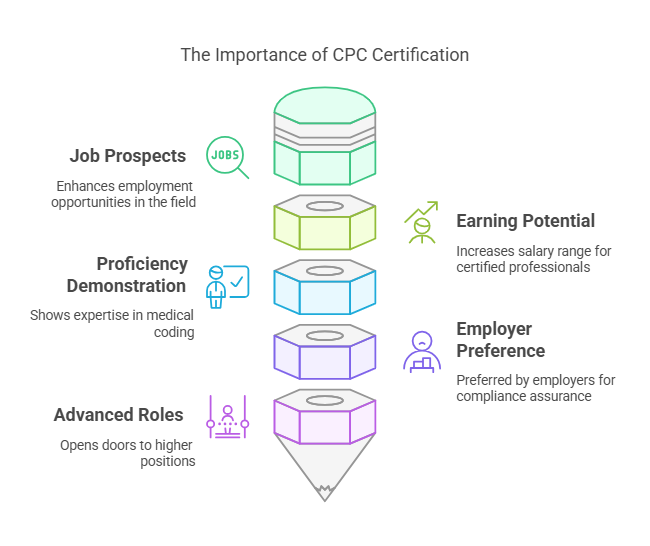Get CPC Certified: Your Path to Becoming a Professional Coder
Certified Professional Coder (CPC) certification is a credential that validates expertise in medical coding. Issued by the American Academy of Professional Coders (AAPC), it ensures that professionals have a strong understanding of medical terminology, anatomy, and coding systems such as CPT, ICD-10-CM, and HCPCS Level II. CPC certification is highly regarded in the healthcare industry and is often required for medical coding jobs in hospitals, physician offices, and insurance companies.

Why is CPC Certification Important?
CPC certification is a crucial step for those pursuing a career in medical billing and coding certification. It enhances job prospects, increases earning potential, and demonstrates proficiency in accurately assigning medical codes for billing and insurance claims. Employers prefer CPC-certified professionals from AMBCI because they ensure compliance with regulations and reduce claim rejections.
According to AAPC data, CPC-certified coders earn an average annual salary of $52,600 to $65,300 in 2025, depending on experience and location. Certified coders are also eligible for advanced roles, such as medical coding auditors or compliance officers, further expanding their career opportunities.

How to Prepare for the CPC Exam
To succeed in the CPC exam, candidates must have a solid understanding of medical coding concepts and practical experience in coding procedures. Below are key steps to prepare:
1. Gain Prerequisite Knowledge
Before taking the CPC exam, it's essential to understand medical terminology, anatomy, and pathophysiology. Many coding courses offer structured learning in these areas, helping candidates interpret medical records accurately.
2. Utilize Study Materials
The AAPC provides study guides and practice exams covering CPT, ICD-10-CM, and HCPCS Level II coding. Completing practice tests under timed conditions improves speed and accuracy. Many candidates also enroll in online courses or attend live instructor-led classes for better guidance.
3. Join AAPC Membership
AAPC membership is mandatory for taking the CPC exam. It provides access to study resources, job opportunities, and continued education to stay updated with coding standards. Many training programs include AAPC membership, making it easier for students to begin their certification journey.

Six Lesser-Known Facts About CPC Certification
Apprentice Status for New Coders: The AAPC outlines that passing the CPC exam without prior coding experience results in a CPC-A (Apprentice) designation. To remove the "A," one must gain two years of coding experience or complete an AAPC-approved coding course. AAPC
Open-Book Exam Format: The AAPC confirms that the CPC exam is open-book; candidates can bring three coding manuals: AMA CPT, ICD-10-CM, and HCPCS. However, printed guidelines are not allowed during the online exam. Amazon+4AAPC+4CareerGuide+4
Specialty Certifications Available: Beyond the CPC, the AAPC offers specialty coding certifications in areas like anesthesia, dermatology, and cardiology, enabling coders to specialize and potentially increase their earning potential. AAPC
Remote Work Opportunities: Many CPC-certified professionals have the flexibility to work remotely, accessing job opportunities nationwide. This flexibility is facilitated by the option to take the CPC exam online, which has been available since 2020. AAPC
Lifetime Certification with CEUs: CPC certification remains valid indefinitely, provided coders earn the required Continuing Education Units (CEUs) every two years to stay updated on industry changes.
High Demand for CPC Coders: The demand for medical coders is projected to grow by 8% from 2025 to 2030, driven by an aging population and increased healthcare needs.
Frequently Asked Questions (FAQs)
-
It typically takes 6 to 12 months, depending on prior knowledge and study time.
-
Yes, AAPC offers both in-person and online CPC exams, providing flexibility for candidates.
-
Candidates must score at least 70% to pass the CPC exam.
-
No, a degree is not required, but having medical coding training improves success rates.
-
The CPC exam fee ranges from $399 to $499 in 2025, depending on membership status and package inclusions.
CPC certification is a valuable credential for anyone pursuing a career in medical coding. By preparing effectively, utilizing study resources, and staying informed about industry updates, you can enhance your career prospects and contribute to the accuracy and efficiency of healthcare billing systems.
